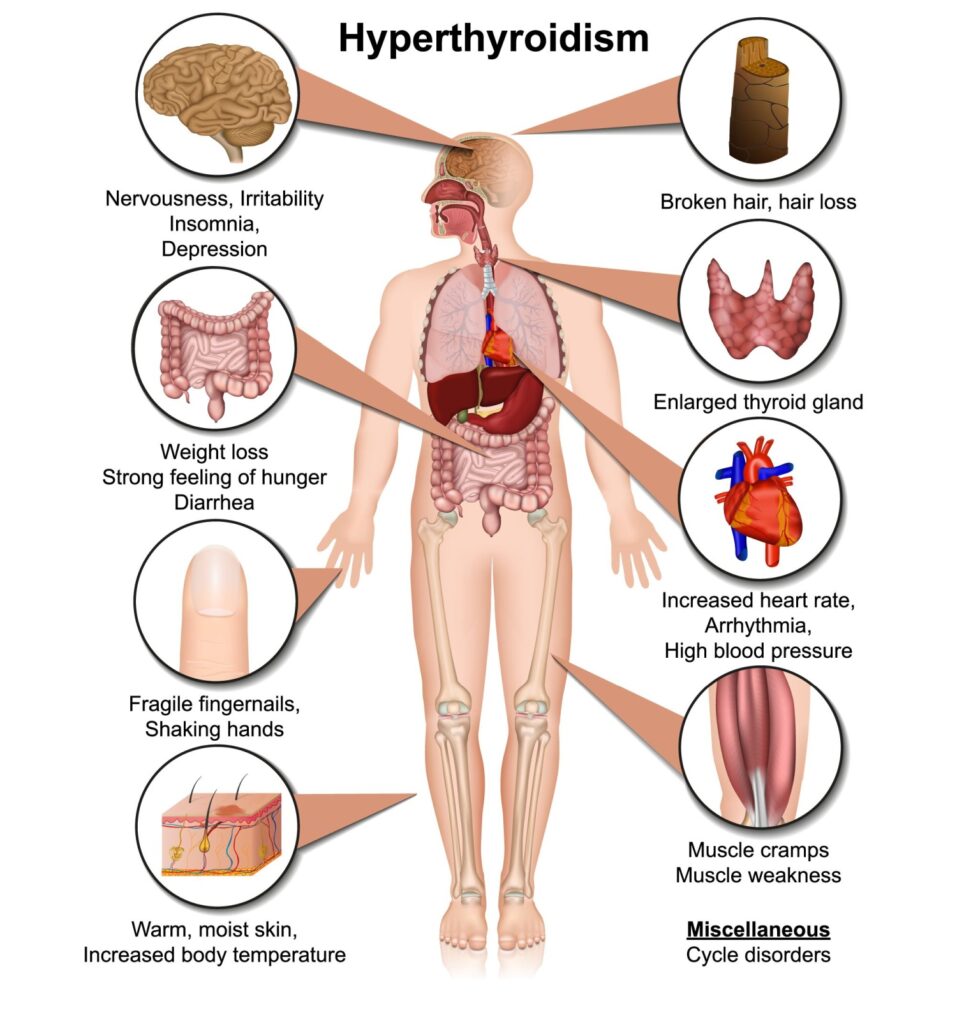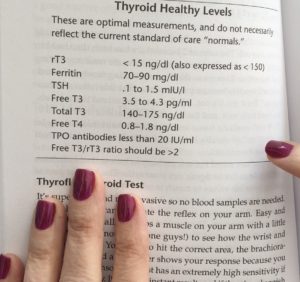What's On This Page?
ToggleWelcome to the dynamic world of thyroid health, where understanding the symptoms can be your first step towards wellness. Hyperthyroidism, characterized by an overactive thyroid gland, affects numerous individuals worldwide, unleashing a cascade of symptoms that can disrupt daily life. In this blog, we’ll unravel the mystery of this condition, peek into the dual nature of Hashimoto’s disease, and equip you with essential lab test knowledge.
Hyperthyroidism Details
Imagine your thyroid gland stepping on the gas pedal, flooding your body with hormones at a pace it wasn’t designed to handle. That’s hyperthyroidism in a nutshell. This condition accelerates your body’s metabolism, causing unintentional weight loss and a rapid or irregular heartbeat, among other symptoms.
Hashimoto’s Fluctuations
Hashimoto’s disease is like a treacherous seesaw, causing your thyroid levels to fluctuate. One day you’re dealing with the sluggishness of hypothyroidism and the next, you’re catapulted into the frenzy of hyperthyroidism. This autoimmune condition keeps you guessing, and understanding these hormonal swings is crucial for managing your thyroid health.
It’s why some doctors diagnose you with both Graves’ disease (hyperthyroidism) and Hashimoto’s (which after all the highs and lows results in hypothyroidism after the gland is destroyed).

The treatments for this condition are covered in other articles that I’ve written. I have dozens of tips for you, and to find out how to treat this use my search box on this website. Type in the key terms of interest.
Symptoms of Hyperthyroidism
Let’s dissect the symptoms commonly associated with hyperthyroidism. The accompanying image is down below with a visual depiction. These symptoms are the primary ones that occur with an overactive thyroid gland, which may or may not occur with a goiter. This is not a complete list, it’s just the most popular symptoms.
- Central nervous system problems
- Hair loss or thinning hair
- Gastrointestinal problems
- Enlarged thyroid gland
- Cardiovascular problems (tachycardia, arrhythmias, hypertension)
- Goiter or enlarged thyroid gland
- Tremors and agitation
- Feeling hot all the time
- Muscle cramps and weakness
- Menstrual cycle disorders, including PCOS (polycystic ovary syndrome)
Statistics show that hyperthyroidism is not a rare guest. It’s estimated that about 1.2% of the US population has it, with women being more likely to develop the condition. The prevalence peaks among those in their 20s and 30s, but it can strike at any age.

A Glaring Omission? Bulging Eyes
It’s not listed on the image above and that’s because it is not in the top 10 most common symptoms of hyperthyroidism. But it can and does occur in some people with overactive thyroid, or Graves’ disease.
If you have this symptom, there is a newly approved medication for it. Ultimately, the bulging eye symptom (termed exophthalmos or proptosis), is best done by managing the levels of thyroid hormone and returning them to normal. There is also a new medication that is FDA-approved now so please refer to my other article, 3 Advantages of Tepezza for Eye Disease.
Lab Tests – The Basics
If you suspect hyperthyroidism, the first step is to get a comprehensive Thyroid Profile, which typically includes as a bare minimum.
- TSH (Thyroid Stimulating Hormone): Reveals how your pituitary gland is responding to thyroid hormone levels.
- Free T4 (Thyroxine): Measures the active form of thyroid hormone in your bloodstream.
- Free T3 (Triiodothyronine): Another active thyroid hormone, often elevated in hyperthyroidism.
Normal levels are NOT optimal levels when it comes to thyroid lab results. Consider reading my compelling article entitled, 5 Essential Tips to Interpret Your Thyroid Lab Results: Normal Isn’t Optimal.
For autoimmune thyroid diseases, the critical tests are
- TPO Antibody Test: Detects antibodies against thyroid peroxidase, an enzyme in the thyroid gland.
- TG Antibody Test: Identifies antibodies against thyroglobulin, a protein produced by the thyroid gland.
There’s one more biomarker called Reverse T3 that you should learn about. I wrote an article for you, Measure Reverse T3 and Get Healthy.

Summary
Hyperthyroidism is a multi-faceted condition with symptoms that touch nearly every part of the body. From mood swings to metabolic upheavals, it’s a condition that requires attention and care.
By recognizing the symptoms, understanding the potential autoimmune connection with Hashimoto’s, and armed with the right lab tests, you can navigate the choppy waters of thyroid health with confidence.
Remember, your thyroid may be small, but its impact is mighty. Listen to your body, and don’t hesitate to seek professional medical advice if you’re experiencing any of the symptoms listed above. Here’s to your health and vitality!
You may be interested in reading my other article, 8 Strategies to Reduce Histamine and Ease Hashimoto’s & Autoimmune Disorders.

Suzy Cohen, has been a licensed pharmacist for over 30 years and believes the best approach to chronic illness is a combination of natural medicine and conventional. She founded her own dietary supplement company specializing in custom-formulas, some of which have patents. With a special focus on functional medicine, thyroid health and drug nutrient depletion, Suzy is the author of several related books including Thyroid Healthy, Drug Muggers, Diabetes Without Drugs, and a nationally syndicated column.

